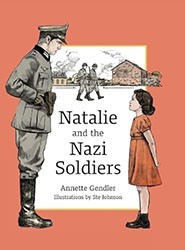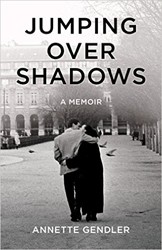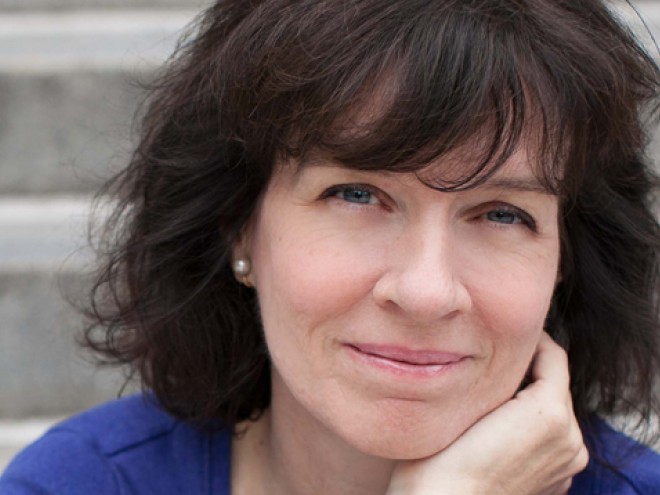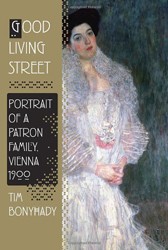Sarah Wildman’s Paper Love: Searching for the Girl My Grandfather Left Behind, her story of looking for the woman her grandfather left behind, is a page turner. This is particularly commendable as readers will generally know the history of the Holocaust. The book, with its recounting of sometimes frustrating, exhausting, and contentious research efforts, ultimately is a memorial to one Holocaust victim’s fate.
Wildman’s doctor grandfather fled Austria in 1938, right after the Anschluss, along with his immediate family, while Valy, “the true love of his life,” as Wildman’s grandmother later called her, hurried back home to Czechoslovakia. Years after her grandfather’s death, American-born Wildman discovers a cache of documents labeled “Patients A‑G.” It harbors Valy’s letters, full of love and, as time goes on, full of desperation. The letters end in 1941. Wildman sets out to find what happened.
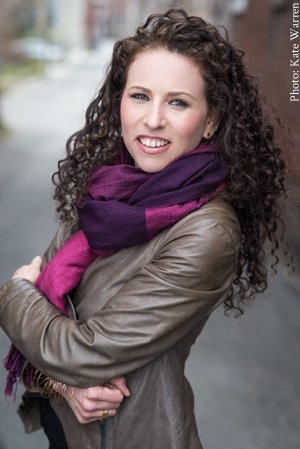 Annette Gendler: What sent you on this quest to find out what happened to Valy?
Annette Gendler: What sent you on this quest to find out what happened to Valy?
Sarah Wildman: The discovery of the letters was, for me, immediately an opportunity to allow one person to narrate her story, as it was happening to her. Letters give readers a sense of what life was really like during this dark time — as it was being experienced. I wanted to use that immediacy and layer her words against my research on the restrictions that stripped her of her right to live a normal life.
AG: Why do you think it is important to some of us of the second or third Holocaust generation to piece together these stories of the past? Why this obsession to dig through archives to figure out the story of someone who’s not even a family member?
SW: This is the crux of the quest – how does the past inform our present? And our future? What do we need to know about the past to understand our identities today? For me allowing Valy to speak was incredibly important on two levels: First, the Nazi effort was to erase these voices, as well as these people, and here was this chance to upend that erasure, in some small, intimate way. Second, I knew Valy’s words were censored, but I set out to place them as much as possible in context – the restrictions, the day-to-day humiliations, the total terror of the time – so that, by immersing myself both in her world of words and her world of deprivation, I might start to understand what this period really was like, and then try to understand what it means for me. I have so often wondered who I would have been and what would have happened.
These were the words of a woman who felt so modern, so relatable, I wondered if telling her story would rescue a voice that might be a bridge to that period. You are correct – she is not a family member. The book is often called a family memoir – but in reality it is the un-family memoir. It is the family that wasn’t. The life my grandfather didn’t live, the woman he didn’t marry, so it’s not so strange to wonder who she was. Had he taken that path, I wouldn’t be here. Her very existence speaks to the tenuousness of all our lives, with or without war, and how we are here based on the choices of those who came before us, as well as geopolitical forces beyond their and our control.
AG:Your book speaks to the power of place. You went to some pains to visit places like Troppau, where Valy was from, even though you knew it would be greatly altered. Why was it so important for you to “be, simply, in Troppau, wander there, maybe run into elderly people, maybe catch some glimpse of the life of the late 1930s, navigate the city?” Why did you need to know exactly where her mother’s shoe store had been? Can’t a house be just a house?
SW: I love this question. For me this became a journey about what the French call – lieux de memoire – places of memory. I wanted to see how cities had gone on being cities, how they had swallowed up what had come before. It was like a walking archeological dig: there are layers of history in each place, and most often people have no idea at all what came before. But I wanted to see – as much as possible – what Valy and my grandfather saw as they walked out the door. If I could stand on the Ringstrasse and hear what they said to each other as the tram passed them by, on that early spring night just before the Anschluss, if I could walk into the courtyard of the Jewish Hospital in Berlin, if I could stand where she had once lived, I could feel that much more their presence. Also I wanted to see places where great trauma had taken place that were not concentration camps. There’s a moment when I realized that the last building where Valy’s mother worked in Berlin was a day care center and the children were deported while their mothers were at their factories. The image of this destroyed child-care center, on a street that is now filled with cool shops and art galleries, was unbelievably devastating for me.
AG: Paper Love also strikes me as a search for a lost culture, your grandfather’s Vienna. Do you feel, after spending so much time in the Vienna of today, that you have a better understanding of your grandfather’s world of the 1930s? Have you been able to reconcile, for yourself, your affinity for this city even though it is fraught with uncomfortable encounters, such as the still vandalized Jewish cemetery?
SW: I have often thought that what must have been most discomforting to my grandmother was not necessarily just the idea of Valy, though of course there was that, but that she could never exactly know the world from which my grandfather had come – not only because she wasn’t born there, but because so much that made vibrant Jewish Vienna so vibrant had ceased to exist after the war. Sure, there were Jews who returned, and yes, there were some Jews who remained. But the city of my grandfather’s youth had been leached of that breath and vitality that he had so thrived upon.
When I first visited Vienna, it felt so museum like, I couldn’t quite see how I would ever survive there. And then it began to open up for me; I began to love the streets, the streetcars, the difficulty. Surely, in part, the reason that I fell in love with Vienna was as much the obvious bits – the art, the Naschmarkt, the architecture, the opera – as that I had the marvelous opportunity to make friends there. With them I was able to navigate the city, and discuss its problems, in an honest way, with those who are of the third generation of Austria and Germany as well as Jews. Indeed, the night after I went to that cemetery, I went out with two close friends, and we talked well into the night. Without them the experience would have been far lonelier, and more terrifying. Strangely enough, later I realized the bar we ended up at that night was across the street from the grocery store my grandfather’s half-brother had once owned. Places of memory, everywhere.
AG: Your title, Paper Love, captures not only the trove of love letters that form the heart of the book, but also the fact that often a “small mention in [a] file […] might simply be the only evidence that a person lived at all.” Do you find it troublesome that our paperless generation won’t leave a paper trail? Nothing tangible?
SW: I have often thought that it is a shame that my children will not know the simple joy of, first, receiving a letter in the mail, and then, years later coming across that letter, and remembering who you were then, and who the letter writer was. I am of the generation that had a brief dalliance with paper and pen – when I lived in Jerusalem in college, I regularly exchanged letters with friends, all of which are still in a box in my parents’ home. I have the letters from high school, telling of loves and hates and stories all in a way a bit more conscious than we are now, in a our often disposable email world. So yes, I think we are strangely almost erasing ourselves, even in our crazy over-documented lives.
AG: Why did you choose to wrap up the book with the postwar years of your wider family, the stories of “unhappy survival,” rather than ending it with Valy?
SW: I wanted to come back, in some way, to the other people of the box, and also to the legacy of my grandfather’s previous life, and the choices they made after the war to suppress so many of their stories. I felt that to better understand their silence, you needed to see that there was a brief moment that they spoke of their pain in 1945, 1946 and then it was as if a collective decision was made to end that conversation, forever. But I wanted to know how those relationships had reconnected after an eight year silence, after the European apocalypse had taken place. For so many of them, they never had what Americans like to call “closure” – they never knew exactly what their loved ones had gone through. And that must have haunted them.
 AG: After all this work, do you feel you understand your grandfather better? Or did your work, in the end, leave you with more questions that you wish you could have asked him?
AG: After all this work, do you feel you understand your grandfather better? Or did your work, in the end, leave you with more questions that you wish you could have asked him?
SW: Honestly, both. I believe I now know far better the real man, versus the two-dimensional picture I had as his granddaughter. But I also want to know a great deal more, particularly how was he able to know what he knew, to have experienced what he had experienced, and still forever look forward, forever live with such optimism, with such joy? There is a letter towards the end of the book, written to his childhood best friend Bruno in 1986, in which he implores Bruno to live with “Entzuecken,” with delight. I love that letter. To live in the moment! How did he do that?
Annette Gendler is a nonfiction writer. She has completed a memoir about the impossible love between a German and a Jew that happened twice in her family, once to fail during WWII, and once to succeed in her own life. An excerpt, “Giving Up Christmas,” was published in Tablet Magazine in December 2012. Visit her atwww.annettegendler.com.
Related Content:
Annette Gendler’s work has appeared in the Wall Street Journal, Tablet Magazine, Kveller, Bella Grace, and Artful Blogging, among others. She served as the 2014 – 2015 writer-in-residence at the Hemingway Birthplace Home in Oak Park, Illinois. Born in New Jersey, she grew up in Munich, Germany, and now lives in Chicago where she teaches memoir writing.
